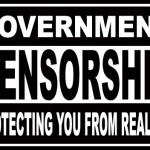Written by: Nazzy, Puff Critique
You would never think that a film ratings board would hold so much influence over a society. The Motion Picture Association Of America (MPAA) was established in order to free society from censorship by implementing a ratings system that would shield children from the obscenity of adult language and behavior. Lately, however, it’s activities in bed with Congress and the big studios, its anonymity, and the way in which it arbitrarily judges films is iniquitous.
How bad can it be for the film industry, it’s only a ratings board?
Ratings matter. Good luck trying to get sponsors and ads for your film if it’s given an NC-17 (no children allowed) rating. No company would want to take responsibility for that. Good luck getting the studio to release it in theaters or getting people aware of the film in the first place. It won’t happen. Most film studios and filmmakers beg and strive for the R-rating (parental guidance for children), at least people would know about it. And if you feel like declining and not take a rating? Unrated films are basically anonymous unless you head down to your local DVD store (if there are any around nowadays). Generally, filmmakers make two versions of a film, the rated and then the unrated, where we see all the dirty details.
Who are the MPAA?
Nobody knows. We don’t know who they are, on what basis they prescribe ratings, or how many there are. Kirby Dick attempted to find out, for all details watch the documentary This Film Is Not Yet Rated; a great film that basically explains the worst of the ratings board and tries to find out who’s on it. Apparently, it was supposed to be made up of “ordinary” parents who have children from the ages of 5-17 years and have a term limit of five years. Reality says otherwise, most of them have kids in their 20s and have been on the board for years. There is also a strong relationship between politicians and administrators on the MPAA. Just Google the names Jack Valenti or Chris Dodd (the same guy who drafted the Dodd-Frank Wall Street bill).
So why not just make your films less graphic?
There are two things wrong with that.
First, we don’t know how far to go with the graphics. Generally, films made by independent studios have absolutely no idea what material they need to cut if they’re given a strict rating. When South Park producers Trey Parker and Matt Stone were making the South Park film (produced by Paramount) they got details and notes by the MPAA board on what they should cut in order to get the R-rating. When they were doing Orgazmo under an independent, the MPAA “couldn’t tell them what to cut because that would make them a censorship group.” How ironic. The big studios (Viacom, Time Warner, Disney, etc.) are practically in bed with the MPAA.
Second, it means taking it. Take the rating and deal with it, because we’re in charge. We’ll tell you what is okay for movies; we’ll set the standards, and tell you how to raise your kids. The MPAA has a history of rating films more conservatively for sexual behavior rather than violence. Heads being decapitated? No problem PG-13 as long as it’s not too graphic. Exposed breasts? R-rating minimum. No negotiations. If I were a parent, I would be much more cautious about violence around my kids than nudity or language.
So what do we do?
I have two suggestions. Either, cut the MPAA or change it.
You can make the organization more transparent with their ratings and their administrators. Who are they? What are their values? What are the ratings based off of? And, most of all, who funds them?
You can either do that, or just cut the MPAA altogether. Let me clarify, I’m all for a ratings system, but this group was established in the 1960s when information was hard to come by. Now, you can Google a film and you’ll have countless independent reviews and recommendations of the film and its intended audiences. Go to parentstv.org (though I’m not fond of the organization, but at least it’s not mandatory) and they will give you a play by play of every naughty word, violent act, and sexual innuendo a film has. The ratings would be unofficial but still valid because the consumer is choosing where their sources on based on their own values. Forget this anonymous board of “ordinary parents” and let us have our say. All in all, the MPAA ratings board is an indirect, but powerful form of censorship.
Nazzy S. is the author and editor for Puff Critique. Twitter: @PuffCritique


